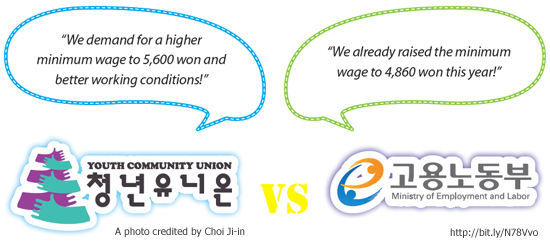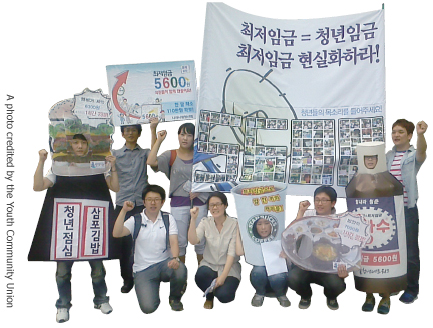As many college students worked part-time jobs during the summer season, the issue of minimum wages rose to the surface of Korean society. A minimum wage is the lowest hourly, daily or monthly remuneration that employers may legally pay to workers. Minimum wage laws are in effect in many jurisdictions to assure workers a reasonable standard of living. In 2012, the minimum wage in Korea is set at 4,580 won an hour and 957,220 won a month. Currently, almost 100 million youngsters receive pay packets that are around or below the minimum wage. Even if these young people are paid the minimum wage, 4,580 won, this wage is still not enough for them to afford their living costs due to hiking commodity prices and expensive college tuition fees. In this edition of Society, readers can witness examples of unfair treatment that many young part-timers and the young non-regular workers experience. Furthermore, The UOS Times is going to talk about what youngsters can do to better understand and to raise the minimum wage.
It is okay to say “It hurts”
1. Painful but Beautiful Youth?
2. Raising Our Voices
Young workers have kept their mouth shut firmly, although their ‘rights to work’ has been clearly violated by some employers. However, things are changing! Recently, some youngsters started to raise their voice to express their pain! With the Youth Community Union, established in March 2010, young people have started to share their experiences with one another, reveal their painful experiences, and start to make moves to ensure their rights to work through such an issue as ensuring the proper minimum wages. As a result of their efforts, young workers charged the convenience stores who exploited young part-time workers by paying them less than minimum wages. Moreover, the Youth Community Union succeeded in giving about six billion won in ‘unpaid checks’ back to 3,000 part time workers at franchised cafes by charging these franchises for violating ‘Labor Standards Act,’ which stipulates employers must pay overtime to employees working 15 hours or more per week.
A Tough Way to Guarantee and Raise the Minimum Wage
1. A Raise in Minimum Wage: Youth Community Union VS Current Administration
Currently, the Youth Community Union is in clear opposition to some businesses and administrative leaders including officials in the Ministry of Employment and Labor. The Youth Community Union argues that the increased minimum wage, 4,860 won, is also not enough for the youth to sustain themselves, especially in metropolitan areas around Seoul. However, current administrative and business leaders disagree to this proposal to increase the minimum wage because this would ultimately create additional burdens for Korea’s mounting economic and financial woes. They say keeping wage increases to a minimum contributes to the price-competitiveness of Korea in the global market, especially at a time when the rest of the world is suffering from the 2008 financial crisis. In that, The UOS Times listened to these stories from the other side, the Youth Community Union, which calls for the rights of the youth regarding the issue of minimum wages. Furthermore, to find out the limits the youngsters face, The UOS Times asked for an explanation from Youth community Union director, Kim Hyung-kook.
2. The Obstacles
After this interview, it was clear that the youth needs a raise in the minimum wage. Current part time jobs, which many youngsters take to manage their hiking college tuition and commodity prices, in fact, do not help them to live a stable and reasonable life. Though these youngsters work day and night, there is not much left after paying off necessity costs such as housing, food and transportation expenses with their minimum income. The youth in their 20s and 30s, who are very sensitive to cultural and social trends, could neither afford these cultural and social activities nor save money for their future. With this consideration in mind, many youngsters in harsh situations gather together in line with the Youth Community Union, by facing the reality and taking strong steps to guarantee and further raise the minimum wage. However, they have reached the limit.

What Can We do?
1. Changes in Perception and Small Changes
We have concluded that the current minimum wage is not enough for the youngsters to live a stable life and to prepare for their brighter future. There are obvious political and social obstacles to guarantee and a raise of the minimum wage. At this moment, I suddenly think of the comment made by Kim Hyung-kook where he stated, “The reason why the dream of half-priced tuition was achieved is because youngsters made an initial move to make it happen.” It is so true in that youngsters, recognizing their own rights to education, voted for candidate Park Won-soon who made a promise to cut tuition fees in half. Therefore, youngsters should first recognize their right to work, and act first to look for a significant breakthrough on the issue of minimum wages. Youngsters should pay more attention to various activities and campaigns to demand better working conditions for young workers. They need to exercise their rights to vote and sign their names for various campaigns to improve the rights of young workers.
2. Our Right to Work
Youngsters in Korea have never been educated nor informed of their work rights throughout their total 12 years of educational curriculum. The youth need to recognize their right to work and should be provided enough information about it, because there are many cases where youngsters are often exploited and mistreated by employers due to their lack of legal understanding on their right to work. In order to stop this from happening, The UOS Times is going to give readers some useful information about our employment rights.
*Part-timers are allowed an additional daily wage if they work over 15 hours per week.
*Night time workers who work from 10p.m. until 6a.m. should be paid an additional 50 percent of their standard wage. This also applies to workers on holidays.
*The Youth Community Union is currently running a legal assistance program to help educate young workers about their employment rights. Anyone who has experienced unfair treatment regarding work issues such as overdue wages, the violation of minimum wages, and unfair dismissals can get consultations for free.
In this edition of magazine, The UOS Times focused on the issue of minimum wages. We know that guaranteeing and raising the minimum wage are necessary for young workers. However, the way to achieve this goal is still tough and long. The youngsters in this era should open their mouths and start raising their voices. Though we cannot expect drastic changes over a night, working on the rights of young workers, especially on the issue of minimum wages, would be a stepping stone to improve the rights of youngsters in political, social, cultural and financial ways.

INTERVIEW
Q. Some have said, ‘A Minimum Wage Increase’ badly influences employment and thus creates burdens for economic growth. What is your opinion on this?
A. I believe there is no research that proves ‘a minimum wage increase has a negative impact on employment.’ However, in return, there are some researches that show a positive relationship between ‘a minimum wage increase’ and ‘employment and economic growth.’ With better treatment and a minimum salary increase, workers are getting paid more and therefore they have more money to spend. Revitalizing the domestic market is the key to economic recovery. Moreover, the bank of Korea and OECD analysts expect the economy to bounce back with a 4~5 percent growth this year. Given their prediction, the current position of the government is not only hard to agree with, but also fails to ensure the purpose of the minimum wage.

A. I would like to emphasize the fact that current minimum wage, 4,860 won per hour and 100,000 won per month, is not enough for a reasonable standard of living. According to the survey conducted by the Youth Community Union and Minimum Wage Council on the spending of the youth in their 20s and 30s, 1,200,000 won per month for a person is a reasonable income to live a so-called stable life. In comparison with a 10 percent wage increase rate during the President Rho administration, the current 5 percent wage increase is definitely not enough.
Q. The Youth Community Union accused the employers of convenience stores and cafes for exploiting young workers by paying them less than the minimum wage. What has been the result of these efforts?
A. About 3,000 young, part-time workers at cafes received over six billion won of their unpaid extra pay. Moreover, this issue successfully elicited quite a response from many people. However, officials from the Ministry of Employment and Labor lack their will to organize a monitoring system to identify and discipline workplaces that violate the current minimum wage act. It is true that some young workers are still being exploited at below the minimum wage in many workplaces.
Q. What are the biggest obstacles of a minimum wage system and a raise in minimum wage?
A. The inefficient decision making system of the Minimum Wage Council and the current administration’s lack of will to protect young workers’ rights are the biggest obstacles to realize and raise the minimum wage in Korea. The Minimum Wage Council currently adopts a complicated and ineffective minimum wage settlement process, and almost all council committees represent the voice of the current administration, business leaders and employers in the market. In that, the voice of the young workers is barely reflected during the bargaining process. The Ministry of Employment and Labor also neglects to serve their duties while blaming their negligence on insufficient budget. These administrative agencies should fulfill their responsibilities.

